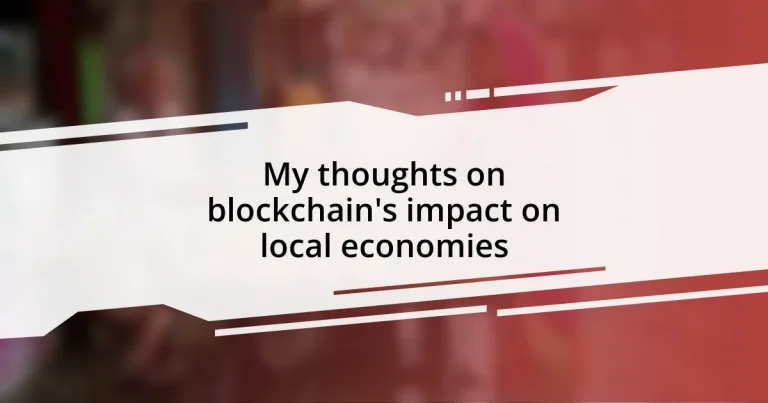Key takeaways:
- Blockchain technology enhances local economies by fostering transparency in transactions, increasing trust between consumers and producers.
- Local businesses can benefit from reduced transaction costs, improved supply chain efficiency, and direct market access through blockchain integration.
- Real-world examples, like a coffee shop’s loyalty program and farmers creating a blockchain marketplace, demonstrate successful implementations that strengthen community ties.
- The future of blockchain adoption looks promising, with trends indicating deeper integration into local businesses and the rise of decentralized finance (DeFi) for enhanced funding opportunities.
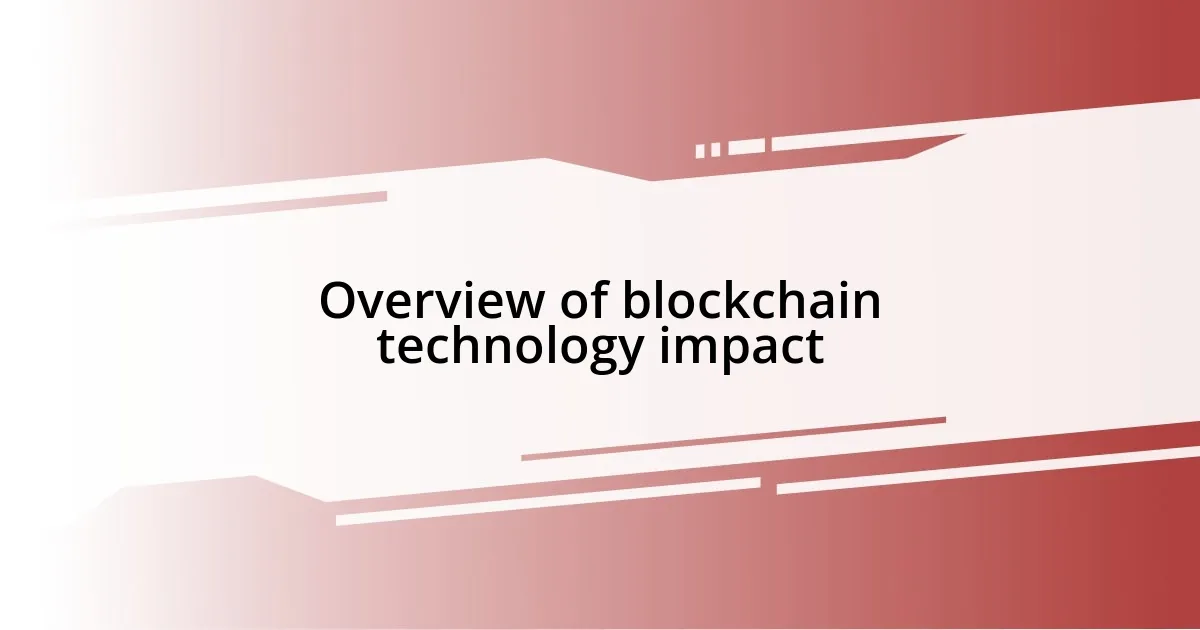
Overview of blockchain technology impact
Blockchain technology has revolutionized the way we think about transactions and trust. When I first encountered blockchain, I was struck by how it creates a decentralized system where everyone can have a say. Imagine being part of a community wherein every transaction is transparent and secure; how much more confident would you feel engaging in local business?
In my experience, the impact of blockchain extends beyond technology into the very fabric of our local economies. For instance, I once observed a small farmer using a blockchain-based platform to sell directly to consumers, bypassing traditional middlemen. This not only improved their profits but also fostered a greater connection between producers and consumers, making local economies more resilient.
There’s something profoundly exciting about the potential of blockchain to empower communities. Think about it—what if every local business could leverage blockchain to streamline operations, reduce costs, and enhance trust? It’s a possibility that excites me, as it opens doors for innovation that can uplift our neighborhoods and bring us closer together.

Benefits for local businesses
Local businesses stand to gain significantly from the integration of blockchain technology. From my perspective, one of the most profound benefits is the increased transparency that blockchain provides. I recall a local coffee shop owner who shared how implementing a blockchain system allowed customers to trace their coffee’s journey from farm to cup. This not only boosted customer trust but also encouraged people to support local growers, creating a community-centered approach to business.
Here are some specific benefits for local businesses using blockchain:
- Enhanced Trust: Customers can verify product authenticity and sourcing.
- Reduced Transaction Costs: Smart contracts minimize intermediary fees, increasing profits for local vendors.
- Improved Supply Chain Efficiency: Real-time tracking streamlines logistics, reducing waste and ensuring freshness.
- Access to Global Markets: Small businesses can reach customers worldwide without hefty export fees.
- Community Engagement: Local businesses can build connections, fostering loyalty through transparency and shared values.
In my view, these benefits create an ecosystem where local businesses thrive, leading to a more vibrant and interconnected community.
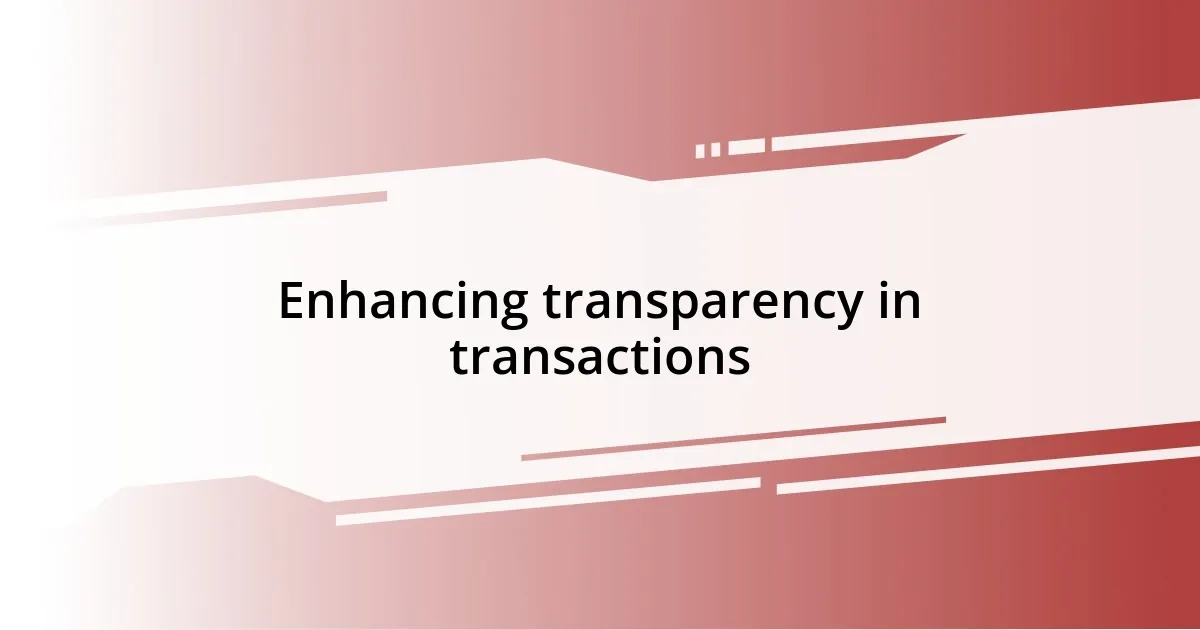
Enhancing transparency in transactions
When we think about enhancing transparency in transactions, blockchain emerges as a game-changer. I remember attending a farmer’s market where one vendor proudly displayed a QR code linked to their blockchain records. Customers eagerly scanned the codes, revealing the specifics of their produce’s journey. This level of transparency not only sparked conversations but also deepened trust between consumers and producers. It’s heartwarming to see people engage with the story behind their food, highlighting that transparency can go beyond numbers.
Moreover, transparency can truly level the playing field. I once spoke with a local artisan who noted that blockchain for their handcrafted goods allowed them to showcase their craftsmanship and ethical sourcing, seamlessly. By allowing customers to trace the ingredients and materials used, they were able to build a narrative that resonated with health-minded consumers. It established a connection that was previously difficult to achieve, demonstrating how blockchain can not only enhance trust but also narrate the story behind local products in a more engaging way.
The thrill of seeing local economies flourish through transparent transactions cannot be overstated. One recent experience I had was walking into a local brewery where patrons were raving about the transparency of their sourcing practices, all thanks to their blockchain system. By knowing precisely where their ingredients originated, it fostered a feeling of community pride and ownership among the customers. I can personally say there’s something exhilarating about knowing that my choices have a direct connection to supporting local enterprises and creating a healthier economy.
| Aspect | Traditional Transactions | Blockchain Transactions |
|---|---|---|
| Transparency | Limited visibility on sourcing and authenticity | Full traceability of each transaction |
| Customer Trust | Often dependent on brand loyalty | Built through verifiable records |
| Costs | Often includes intermediary fees | Reduced or eliminated through smart contracts |
| Engagement | Minimal interaction between producers and consumers | Encourages active participation and questions |

Improving supply chain efficiencies
When I think about how blockchain enhances supply chain efficiencies, I recall a local food co-op that adopted this technology. They began using real-time tracking for their fresh produce, which enabled them to minimize waste significantly. Isn’t it amazing how a small change can lead to better resource management and fresher products on the shelf?
One day, while chatting with the co-op manager, she mentioned how their customers appreciate the ability to see precise delivery times and routes. This information reassured customers that they weren’t just buying food; they were investing in a system that prioritizes efficiency and quality. I find it inspiring how transparency around logistics allows both businesses and consumers to participate in a more sustainable economy.
There’s a certain thrill in knowing that blockchain can revolutionize local supply chains by connecting farmers directly with retailers, eliminating unnecessary middlemen. Just the other day, I saw a local bakery proudly display acknowledgment of the farmers who supplied their grains, all thanks to a blockchain-enabled supply chain. It’s empowering to think that these efficiencies not only support local economies but also foster relationships based on trust and accountability. How could any of us not feel a sense of pride in being part of such a movement?
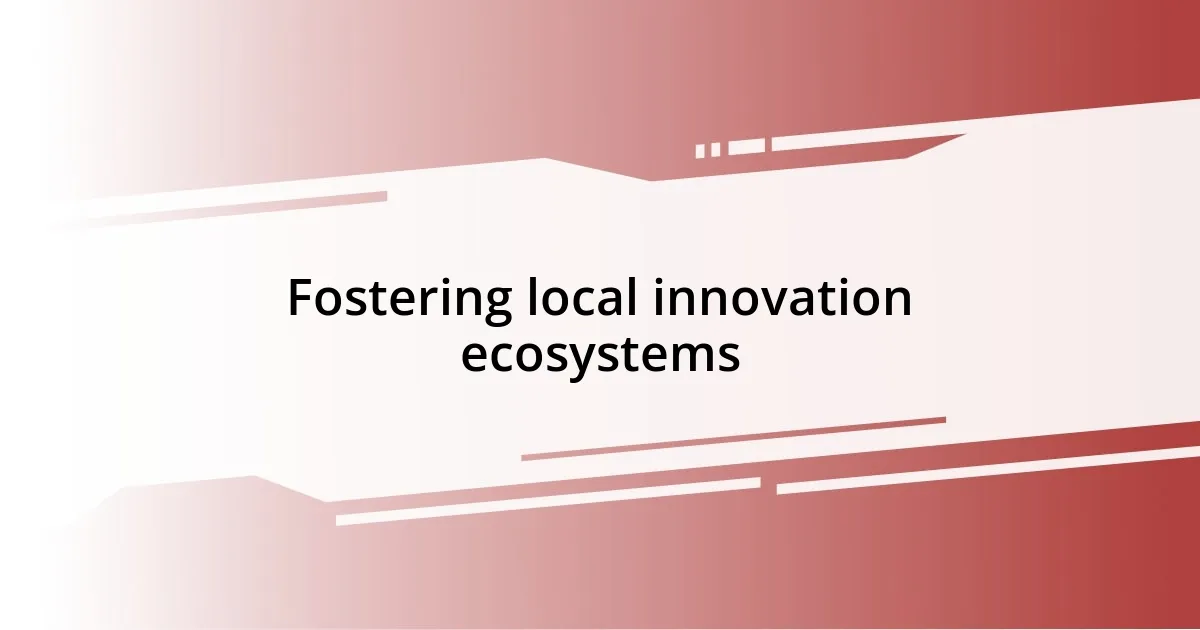
Fostering local innovation ecosystems
In my view, blockchain technology offers a unique avenue for fostering local innovation ecosystems. I remember attending a startup showcase in my town, where local innovators proudly presented their blockchain-based projects. Each entrepreneur explained how this technology not only streamlined their processes but also opened doors for collaboration and idea-sharing among local businesses. It felt like a vibrant tapestry of creativity and resourcefulness, where everyone was eager to innovate together.
One particular conversation stands out to me. I met a local tech developer who created a platform allowing artisans to trade skills and services securely on the blockchain. Not only did this strengthen the community, but it also inspired others to think outside the box. The excitement in the air was palpable, as people realized that utilizing blockchain could enhance their creativity and catalyze collective growth. Can you imagine the synergy that occurs when individuals come together, leveraging technology to uplift each other and drive local progress?
I’ve seen firsthand how blockchain encourages knowledge sharing among diverse local businesses, leading to extraordinary outcomes. During a community workshop, local farmers and tech enthusiasts collaborated to create an app that tracks sustainable practices using blockchain. It reminded me of the beauty of shared learning—an ecosystem where innovation blossoms because everyone contributes their unique expertise. Isn’t it invigorating to think that local economies can thrive when we embrace technology to elevate one another’s talents?

Case studies of successful implementation
One striking case study that comes to mind is a small local coffee shop that implemented blockchain for managing customer loyalty rewards. Instead of traditional punch cards, they created a digital system where customers earn tokens through purchases, which can then be tracked and redeemed easily. I remember the buzz in the shop when regulars talked about how they loved seeing their progress in real-time; it created a stronger sense of connection to the business. Isn’t it fascinating how a simple upgrade can transform the way customers engage with a brand?
In another instance, I came across a local artist co-op that used blockchain technology to register ownership of digital art pieces. This innovative method not only secured artists’ work but also fostered a sense of community. I once attended an exhibition where a local artist shared their journey of using blockchain to sell their art directly to buyers. The pride in their voice was contagious, and I couldn’t help but admire how the technology empowered them beyond traditional galleries. How refreshing is it to see creativity flourish when artists can control their narratives?
A particularly memorable success story involves a group of local farmers who banded together to create a blockchain-based marketplace for organic produce. They pooled their resources not just for marketing, but also for transparency in their sourcing practices. I remember visiting one of their farms and speaking with a farmer who described the joy of customers knowing exactly where their food came from. That personal touch can change everything, don’t you think? By utilizing blockchain, they’ve built a thriving community that not only supports local economies but also deepens trust between growers and consumers.
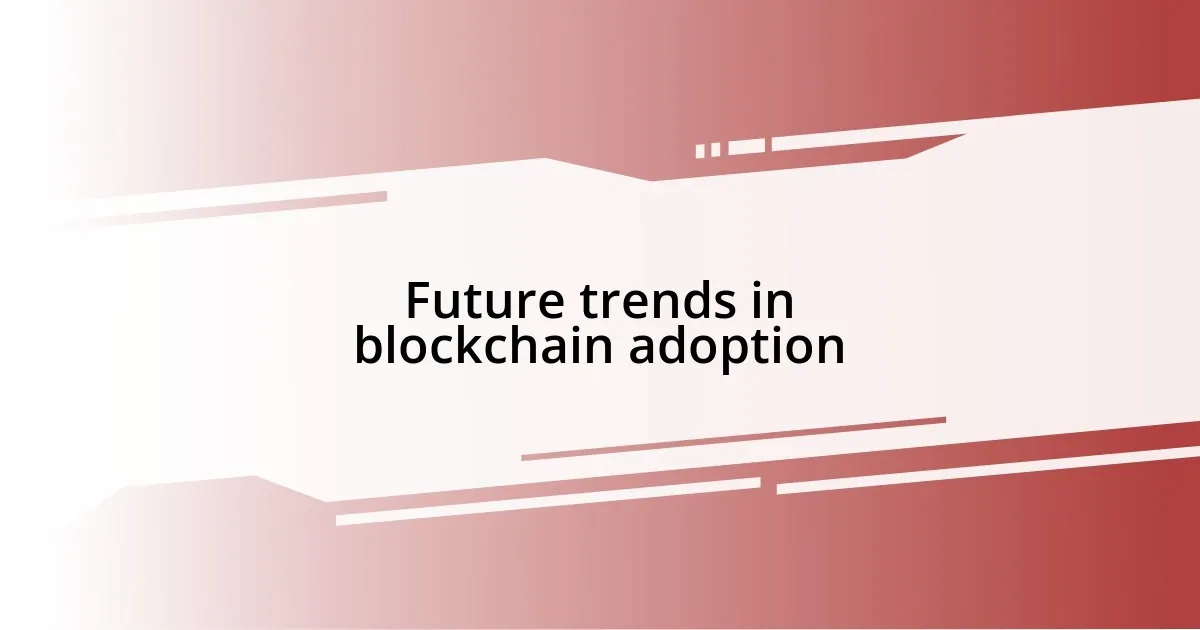
Future trends in blockchain adoption
As I look ahead, it’s clear that the future of blockchain adoption in local economies is bright and full of potential. I’m particularly excited about how small businesses will increasingly rely on blockchain to enhance transparency in their transactions. Just the other day, I was chatting with a local retailer who mentioned that they’re exploring ways to implement blockchain for supply chain management. The idea of their customers being able to trace products right back to their origins is not just intriguing—it’s a game-changer for building trust within the community. Can you imagine the impact of such transparency on consumer choices?
Moreover, I’m noticing a trend toward integration with existing local applications. A friend of mine, who owns a delivery service in our neighborhood, is keen on adopting blockchain to streamline logistics. He believes that by leveraging smart contracts, deliveries could become more efficient and cost-effective. This could lead to a stronger local economy by allowing businesses to save money and reinvest those resources where they matter most. I can’t help but wonder how this shift could change the dynamics of local commerce.
Lastly, the rise of decentralized finance (DeFi) is worth considering. I recently attended a forum where I met a financial advisor passionate about educating local entrepreneurs on accessing capital through blockchain-based lending platforms. The enthusiasm in the room was contagious as many realized these options could level the playing field for those who previously struggled to secure funding. Isn’t it inspiring to think that with the right tools, local businesses can access resources that empower them to grow?












